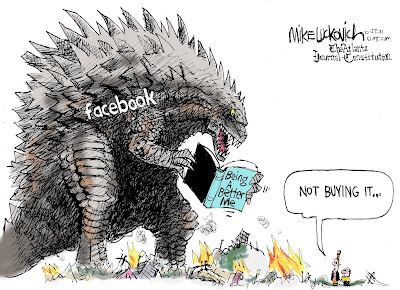Critics of Facebook Say Name Change Can't Hide Company's Harm
In Hebrew, "Meta" means "Dead"
BRETT WILKINS for Common Dreams
 |
| Facebook CEO Mark Zuckerberg announced the company's renaming to Meta during the Facebook Connect virtual and augmented reality conference on October 28, 2021. (Photo: Meta) |
Tech ethicists and branding professionals said consumers should not be hoodwinked by Facebook's name change, which numerous observers compared to earlier efforts by tobacco and fossil fuel companies to distract attention from their societal harms.
Facebook co-founder and CEO Mark Zuckerberg announced the Meta rechristening during Facebook Connect, the company's annual virtual and augmented reality conference, explaining that "we are a company that builds technology to connect people and the metaverse is the next frontier, just like social networking was when we got started."
"Some of you might be wondering why we're doing this right now," he added. "The answer is that I believe that we're put on this Earth to create. I believe that technology can make our lives better."
Vahid Razavi, founder of the advocacy group Ethics in Tech, told Common Dreams:
"Don't be fooled. Nothing changes here. This is just a publicity stunt
hatched by Facebook's PR department to deflect attention as Zuckerberg
squirms" over the negative press from recent whistleblower revelations.
Former Facebook
employees-turned whistleblowers say the
company's profit-seeking
algorithms—and its executives who know their
insidious impacts—are responsible for the mass dissemination of harmful
content, including hate speech and political, climate, and Covid-19
misinformation.
Siva Vaidhyanathan, a media studies professor at the University of Virginia and author of the book Antisocial Media, told Time that "the Facebook of today has never been the end game for Zuckerberg."
"He's
always wanted his company to be the operating system of our lives that can
socially engineer how we live and what we know," Vaidhyanathan
continued, adding that the new name is "not going to change his vision for
his company—he's never let anybody on the outside change his mind."
Zuckerberg, he
said, "wants to take the dynamic of algorithmic guidance out of our phones
and off of our computers and build that system into our lives and our
consciousness, so our eyeglasses become our screens, and our hands become the
mouse."
Some observers compared Facebook's attempt to rebrand itself to what they
called similar efforts by Big Tobacco and fossil fuel corporations.
"It didn't
do anything," Laurel Sutton, co-founder of the branding agency Catchword, told Time.
"People still knew that Altria was Philip Morris and they didn't
rehabilitate their reputation simply because they changed the name."
"There's no
name that's going to rehabilitate the behavior that they've displayed so
far," Sutton said of the social media giant. "Maybe put that time and
energy into rehabilitating their morals and ethics and business decisions
rather than just trying to slap a new name on something."
